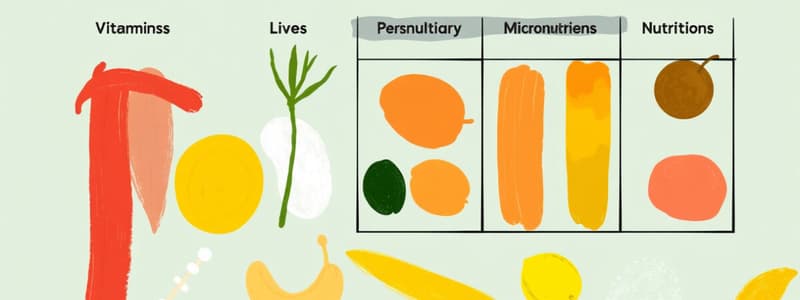Podcast
Questions and Answers
What condition is caused by folate deficiency?
What condition is caused by folate deficiency?
- Megaloblastic anemia (correct)
- Osteoporosis
- Rickets
- Scurvy
Which vitamin is required for cell division and normal neurological function?
Which vitamin is required for cell division and normal neurological function?
- Vitamin D
- Vitamin B-12 (correct)
- Vitamin E
- Vitamin K
Deficiency of which vitamin leads to pernicious anemia?
Deficiency of which vitamin leads to pernicious anemia?
- Vitamin B-12 (correct)
- Folic acid
- Biotin
- Vitamin C
What is a main function of biotin?
What is a main function of biotin?
Which vitamin is synthesized by microflora in the gastrointestinal tract?
Which vitamin is synthesized by microflora in the gastrointestinal tract?
Antioxidants decrease the risk of which health condition?
Antioxidants decrease the risk of which health condition?
Which vitamin is primarily responsible for forming rhodopsin, a protein crucial for vision?
Which vitamin is primarily responsible for forming rhodopsin, a protein crucial for vision?
What condition is caused by a deficiency of niacin?
What condition is caused by a deficiency of niacin?
Which vitamin requires carrier proteins for transport in the bloodstream?
Which vitamin requires carrier proteins for transport in the bloodstream?
Which of the following vitamins acts as an antioxidant and protects fatty acids in cell membranes?
Which of the following vitamins acts as an antioxidant and protects fatty acids in cell membranes?
What deficiency is associated with weakness, anemia, and altered nerve function?
What deficiency is associated with weakness, anemia, and altered nerve function?
What is a common cause of thiamine (Vitamin B1) deficiency?
What is a common cause of thiamine (Vitamin B1) deficiency?
What is the primary purpose of the Dietary Reference Intake (DRI)?
What is the primary purpose of the Dietary Reference Intake (DRI)?
Which vitamin needs to be monitored due to potential toxicity when supplemented, especially for those on anticoagulants?
Which vitamin needs to be monitored due to potential toxicity when supplemented, especially for those on anticoagulants?
Which vitamin enhances iron absorption, particularly due to its antioxidant properties?
Which vitamin enhances iron absorption, particularly due to its antioxidant properties?
Which vitamins are classified as fat-soluble?
Which vitamins are classified as fat-soluble?
What is the condition called when there are insufficient vitamin stores in the body?
What is the condition called when there are insufficient vitamin stores in the body?
Which vitamin is known to function like a hormone?
Which vitamin is known to function like a hormone?
Which statement about hypervitaminosis is true?
Which statement about hypervitaminosis is true?
What characterizes fat-soluble vitamins in terms of storage?
What characterizes fat-soluble vitamins in terms of storage?
Study Notes
Dietary Reference Intake (DRI)
- DRI includes national recommendations for vitamin and nutrient intake for healthy individuals.
- Tolerable Upper Intake Limit (UL) indicates potential toxicity from excessive vitamin doses.
- Nurses advise on balanced vitamin intake from foods/supplements and the effects of higher doses.
Vitamins and Minerals
- Considered micronutrients, required in small amounts for various bodily functions.
- Play crucial roles such as cellular activity components, metabolic cofactors, coenzymes, and antioxidants.
- Vitamin D acts hormone-like and serves as a pharmaceutical agent.
Hypovitaminosis and Hypervitaminosis
- Hypovitaminosis occurs due to decreased vitamin intake, altered metabolism, or increased need.
- Physical symptoms indicate long-term deficiencies and diminish vitamin stores.
- Hypervitaminosis, an excess of vitamins, arises primarily from supplementation rather than food intake.
Classification of Vitamins
- Vitamins are classified by solubility:
- Fat-soluble vitamins: A, D, E, K; stored in body fat and require carriers.
- Water-soluble vitamins: B-complex and vitamin C; excreted through urine and circulate freely.
Fat-Soluble Vitamins
- Store in body fat; can accumulate. Daily requirements vary, typically every week.
- Key examples:
- Vitamin A: Vital for vision, growth, and epithelial health. Deficiency leads to conditions like xerophthalmia.
- Vitamin D: Crucial for bone health and immunity; synthesized by sun exposure. Deficiency can lead to rickets or osteomalacia.
- Vitamin E: An antioxidant protecting essential fatty acids; sources include vegetable oils and nuts. Rare deficiencies, but may occur with fat absorption disorders.
- Vitamin K: Essential for blood clotting and bone health; synthesized by intestinal bacteria. Deficiency can cause hemorrhagic disease in infants.
Water-Soluble Vitamins
- Required every few days, easily flushed from the body.
- Major functions:
- Vitamin C: Antioxidant, collagen formation, iron absorption. Deficiency leads to scurvy.
- B Vitamins:
- Thiamine (B1): Energy metabolism; deficiency linked to Wernicke-Korsakoff syndrome.
- Riboflavin (B2): Metabolism coenzyme; deficiency causes ariboflavinosis.
- Niacin: Coenzyme role; deficiency results in pellagra symptoms.
- Vitamin B6: Critical in over 100 metabolic reactions; deficiency linked to anemia and nerve issues.
- Folate: Important for DNA synthesis and fetal development; deficiency causes megaloblastic anemia.
- Vitamin B12: Necessary for cell division; deficiency can lead to pernicious anemia.
- Biotin: Cofactor in metabolic reactions; synthesized in the gut.
- Pantothenic Acid: Vital for metabolism; wide food availability makes deficiency rare.
- Choline: Important for neurotransmitter synthesis; deficiency is uncommon.
Antioxidants
- Include Beta carotene, Vitamins C and E, and selenium.
- Associated with reduced risks for cancer and coronary artery disease.
Studying That Suits You
Use AI to generate personalized quizzes and flashcards to suit your learning preferences.
Description
This quiz covers the Dietary Reference Intake (DRI) and Tolerable Upper Intake Limit (UL) for vitamins and minerals. It explores the advice given by nurses regarding healthy vitamin intake from food and supplements, as well as the potential toxicity from excessive doses. Understand the crucial roles of micronutrients in maintaining health.





